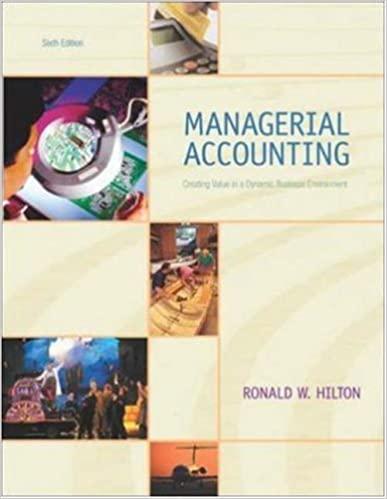Question
Dover Chemical Company manufactures specialty chemicals by a series of three processes, all materials being introduced in the Distilling Department. From the Distilling Department, the
Dover Chemical Company manufactures specialty chemicals by a series of three processes, all materials being introduced in the Distilling Department. From the Distilling Department, the materials pass through the Reaction and Filling departments, emerging as finished chemicals.
The balance in the account Work in ProcessFilling was as follows on January 1:
| Work in ProcessFilling Department | ||
| (3,400 units, 70% completed): | ||
| Direct materials (3,400 x $16.80) | $57,120 | |
| Conversion (3,400 x 70% x $10.90) | 25,942 | |
| $83,062 | ||
The following costs were charged to Work in ProcessFilling during January:
| Direct materials transferred from Reaction | ||
| Department: 43,900 units at $16.50 a unit | $724,350 | |
| Direct labor | 245,730 | |
| Factory overhead | 236,102 | |
During January, 43,500 units of specialty chemicals were completed. Work in ProcessFilling Department on January 31 was 3,800 units, 40% completed.
Required:
1. Prepare a cost of production report for the Filling Department for January. If an amount is zero, enter "0". If required, round your cost per equivalent unit answers to two decimal places.
| Dover Chemical Company | |||
| Cost of Production Report-Filling Department | |||
| For the Month Ended January 31 | |||
| Unit Information | |||
| Units charged to production: | |||
| Inventory in process, January 1 | |||
| Received from Reaction Department | |||
| Total units accounted for by the Filling Department | |||
| Units to be assigned costs: | |||
| Equivalent Units | |||
| Whole Units | Direct Materials | Conversion | |
| Inventory in process, January 1 | |||
| Started and completed in January | |||
| Transferred to finished goods in January | |||
| Inventory in process, January 31 | |||
| Total units to be assigned costs | |||
| Cost Information | |||
| Costs per equivalent unit: | |||
| Direct Materials | Conversion | ||
| Total costs for January in Filling Department | $ | $ | |
| Total equivalent units | |||
| Cost per equivalent unit | $ | $ | |
| Costs charged to production: | |||
| Direct Materials | Conversion | Total | |
| Inventory in process, January 1 | $ | ||
| Costs incurred in January | |||
| Total costs accounted for by the Filling Department | $ | ||
| Cost allocated to completed and partially completed units: | |||
| Inventory in process, January 1 balance | $ | ||
| To complete inventory in process, January 1 | |||
| Cost of completed January 1 work in process | $ | ||
| Started and completed in January | $ | ||
| Transferred to finished goods in January | $ | ||
| Inventory in process, January 31 | |||
| Total costs assigned by the Filling Department | $ | ||
2. Journalize the entries for (1) costs transferred from Reaction to Filling and (2) the cost transferred from Filling to Finished Goods.
| (1) | |||
| (2) | |||
3. Determine the increase or decrease in the cost per equivalent unit from Decemberto January for direct materials and conversion costs. If required, round your answers to two decimal places.
| Increase or Decrease | Amount | |
| Change in direct materials cost per equivalent unit | $ | |
| Change in conversion cost per equivalent unit | $ |
4. The cost of production report may be used as the basis for allocating product costs between and . The report can also be used to control costs by holding each department head responsible for the units entering production and the costs incurred in the department. Any differences in unit product costs from one month to another, such as those in part (3), can be studied carefully and any significant differences investigated.
Step by Step Solution
There are 3 Steps involved in it
Step: 1

Get Instant Access to Expert-Tailored Solutions
See step-by-step solutions with expert insights and AI powered tools for academic success
Step: 2

Step: 3

Ace Your Homework with AI
Get the answers you need in no time with our AI-driven, step-by-step assistance
Get Started


